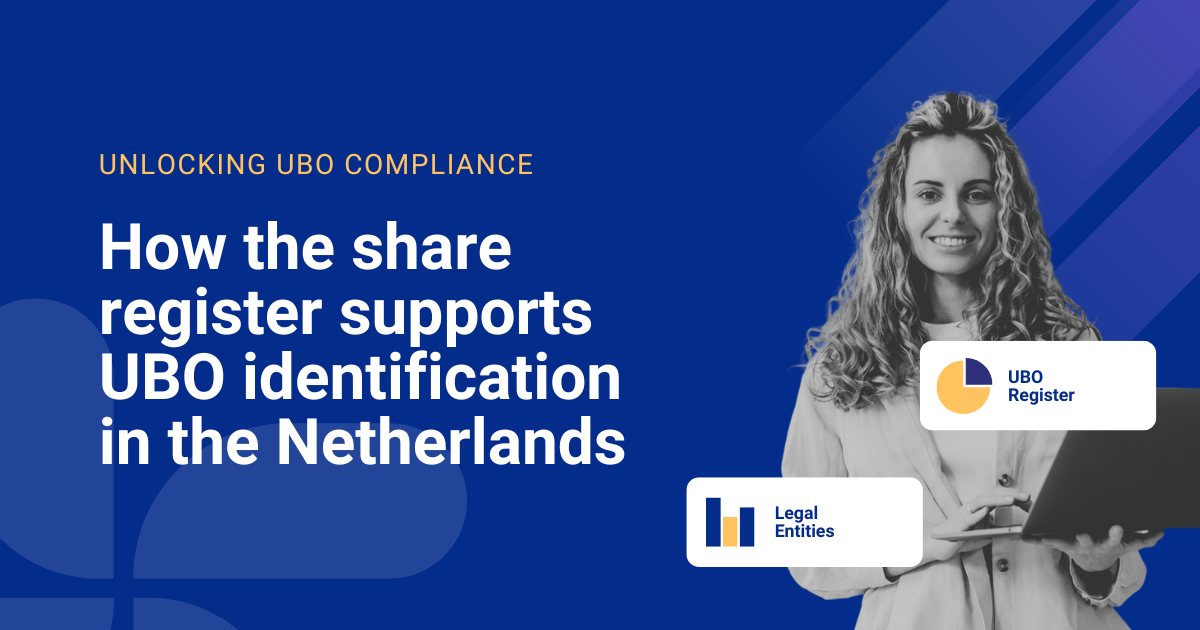A shareholder register: 10 checks to stay compliant [+ best practices]
A shareholder register is more than just a legal requirement; it’s the backbone of transparent and compliant corporate governance.
But what exactly is a shareholder register, and how do companies ensure it stays accurate and up to date?
From tracking address changes and board decisions to logging share transactions and dividend payments, ensuring a reliable register is key. Corporify dives into the legal obligations for registers in Belgium and shares best practices to keep yours compliant and efficient.
What is a shareholder register?
A shareholder register is an official log that includes details about the ownership of a company's shares. Tracking the shares held and issued and providing information on new shares is vital for protecting shareholder rights and ensuring legal compliance.
In both Belgium and the Netherlands, keeping a shareholder register up to date is a legal requirement.
It must include the following information:
- names of shareholders
- location
- share details
- personal details
- the date of acquisition
- the name of each share owner
This information is crucial for regulatory purposes and corporate governance.

Legal requirements for shareholder registers: key to successful shareholder meetings
Under Belgian and Dutch law, every private and public company is legally required to maintain an up-to-date shareholder register. Failing to keep it accurate and current can lead to hefty fines and unnecessary complications, especially during shareholder meetings.
10 checks to keep your shareholder register compliant:
1. Record location changes and update the shareholder register with any changes to shareholder details, while keeping physical addresses current for official communication.2. Track shares held, shares issued, and new shares in the shareholder register.
3. Include the date of transactions and updates, allowing shareholders to stay informed of any changes.
4. Keep logs of payments, capital contributions, and voting rights, and ensure fully paid shares are correctly logged.
5. Oversee shareholder insights and control access and handle bank information securely.
6. Ensure shareholders are entitled to their rights, including the ability to participate in decision-making and receive shareholder returns.
7. Differentiate between shareholders, non-shareholders, and other shareholders with limited rights or interests.
8. Document the company's board decisions related to share oversight.
9. Identify beneficial owners to comply with transparency regulations.
10. Facilitate proxy solicitation procedures for voting representation.

Best practices for an accurate shareholder register
#1 Regular register updates
Keep the shareholder register current by promptly logging location changes, share transfers, and return on shares. This ensures accuracy and legal compliance. Updating details of current shareholders, new shareholders, and any party with vested interests regularly prevents administrative issues.
#2. Digital solutions
Use digital tools to oversee the shareholder register efficiently. They streamline the process, reduce errors, and ensure secure access to shareholder information.
Digital tools like Corporify also streamline the tracking of purchase and sale transactions, the management of fully paid shares, and the facilitation of proxy solicitation for voting representation.
#3 Verify information for shareholders
Regularly verify shareholder details in the register, such as location, address changes, share numbers, and the status of beneficial owners. Cross-checking with official sources helps maintain accuracy and ensures compliance with incorporation requirements.
#4 Ensure security
Protect sensitive information in the shareholder register by restricting access to authorized parties. Secure bank information and ensure that only current shareholders and other entitled individuals can participate in decision-making.
#5 Cost efficiency
Sustaining a shareholder register doesn’t have to be expensive. Many digital solutions offer efficient oversight for a reasonable fee, offering a cost-effective solution for companies of all sizes. This can also simplify workflows such as bid handling and exchange of shares.

The shareholder register and corporate governance
The shareholder register is key to corporate governance. It provides ownership transparency, tracks capital contributions, and ensures compliance with incorporation laws. It also oversees voting rights and payments, and simplifies handling party rights in decision-making.
Proper management of the shareholder register benefits companies by improving transparency and simplifying complex shareholder structures. For example, it helps monitor money flows from equity increases to dividend payouts. An ongoing basis of updated logs ensures seamless operations.
Common shareholder register mistakes to avoid
Managing a shareholder register for a company seems straightforward.
However, there are common pitfalls that can cause legal and operational headaches.
Here are 3 elements that you should keep an eye on:
#1 Not updating the shareholder register consistently
Missing location changes or dividend payments can cause compliance issues. Incomplete records, like missing share info, bank data, or transaction dates, complicate shareholder decisions.
#2 Security matters
Unauthorized access to sensitive records in your shareholder register puts data at risk, so access control is key. Skipping cost-effective digital tools is another mistake, as these solutions save time, eliminate errors, and keep your records accurate.
#3 Not keeping track of share sales and purchases
Don’t forget to document the rights of non-shareholders and stakeholders clearly—overlooking them can cause governance headaches. And keep it simple: too much unnecessary information can overcomplicate the register.

Mastering shareholder registers: get to know Corporify
A well-managed shareholder register is essential for any company. By understanding what a shareholder register is, meeting legal requirements, and applying best practices, companies can streamline governance and stay compliant.
Corporify simplifies these tasks, offering secure, cost-effective ways to oversee shareholder records and financial activities such as exchange, bid handling, and managing party interests.


